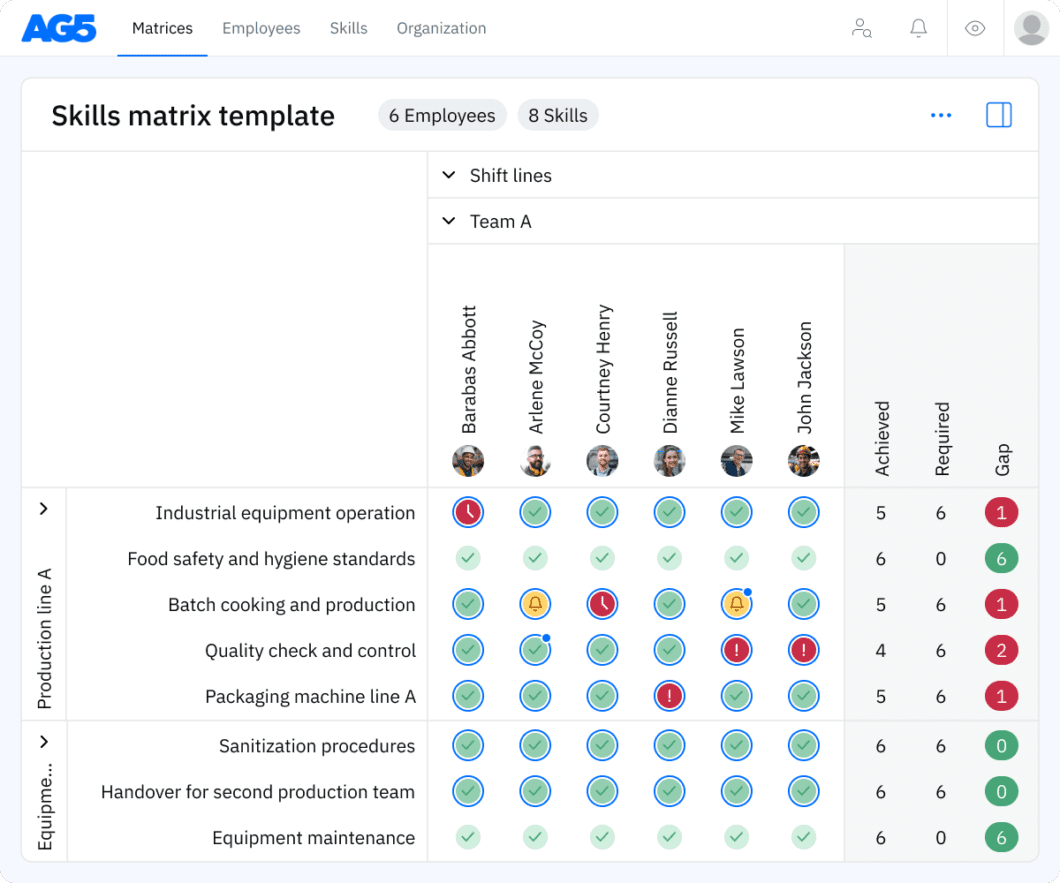Chemical industry skills matrix template
A skills matrix template is a tool that can be used in the chemical industry to effectively manage and assess the skills and knowledge of individual employees or teams.
Download your free template here

Overview Copied
With our free chemical industry skills matrix template, you will receive a clear overview of the skills that are present in your organization, as well as those that are missing. Using this information, you can develop and implement a plan to ensure that your employees’ skills are up to date, comprehensive, compliant, and ready for the future.
Chemical handling and safety protocols
- Understanding and following safety protocols for handling hazardous chemicals
- Proper use of personal protective equipment (PPE) when working with chemicals
- Implementing spill containment and cleanup procedures
- Conducting safety audits and risk assessments for chemical handling areas
- Ensuring compliance with OSHA and other regulatory safety standards for chemical use
Chemical process control and optimization
- Operating and controlling chemical manufacturing processes to maintain consistency
- Monitoring chemical reactions and adjusting process parameters for optimal performance
- Utilizing chemical process automation systems to enhance efficiency
- Conducting regular analysis to optimize chemical yields and reduce waste
- Implementing Six Sigma methodologies to improve chemical production processes
Quality assurance and testing
- Conducting in-process and final product testing to ensure chemical purity and quality
- Performing titration, spectroscopy, and chromatography tests for chemical analysis
- Implementing Statistical Process Control (SPC) to monitor chemical production quality
- Analyzing lab results to identify and address potential quality issues
- Documenting and reporting testing results according to industry and regulatory standards
Regulatory compliance and environmental management
- Ensuring compliance with chemical industry regulations (e.g., REACH, EPA, OSHA)
- Managing the disposal of hazardous materials in compliance with environmental regulations
- Conducting audits to ensure adherence to regulatory requirements for chemical production
- Developing and maintaining documentation for regulatory inspections and certifications
- Implementing waste reduction and recycling programs for chemical by-products
Benefits Copied
Skills management software is important in the chemical industry to ensure that employees possess the necessary skills and certifications for their roles, monitor employee development and training, and facilitate succession planning to prevent skills gaps and ensure safety for employees who often work under hazardous conditions.
Download the free Excel Chemical industry skills matrix template Copied
We also have a free Excel template available that you can download if you are not ready to get started with AG5. To download it, please complete this form here.
Author Copied
Revisions Copied
Tired of managing skills in Excel?
Say goodbye to Excel matrices. Start using AG5’s plug and play skill matrix software.
Recognized by G2 for Excellence in Skills Management

